Презентация lesson 1 January

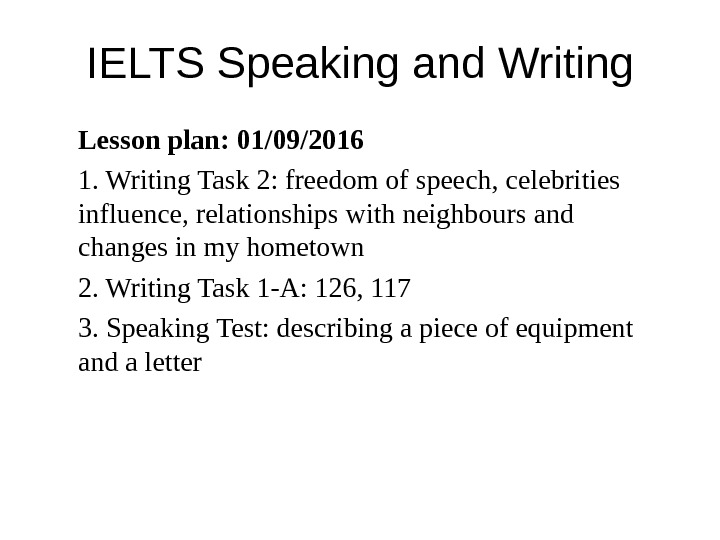
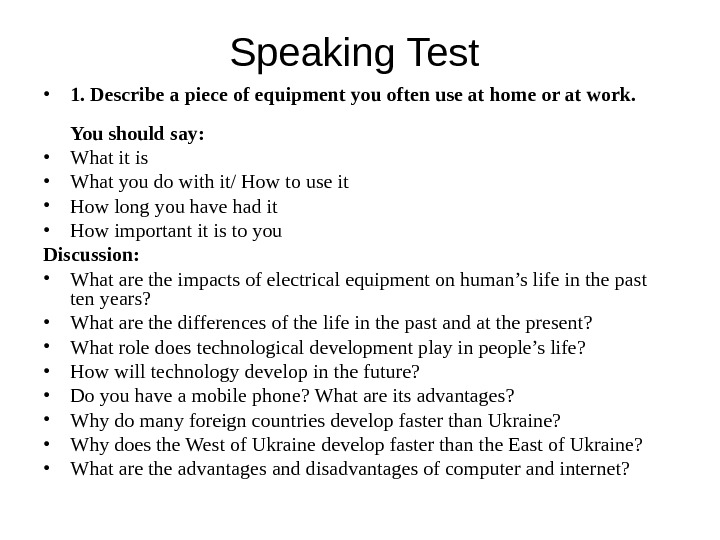
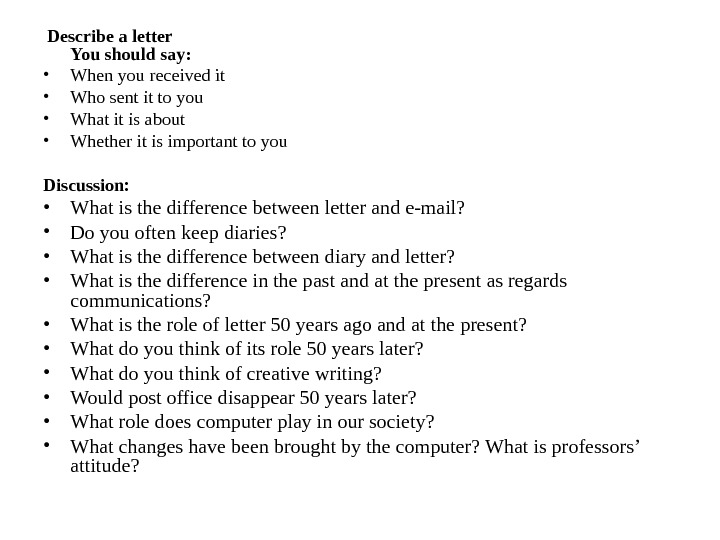
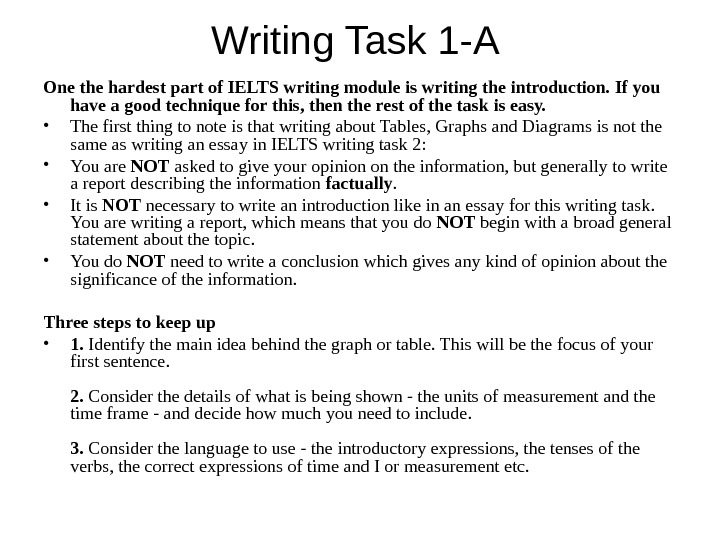
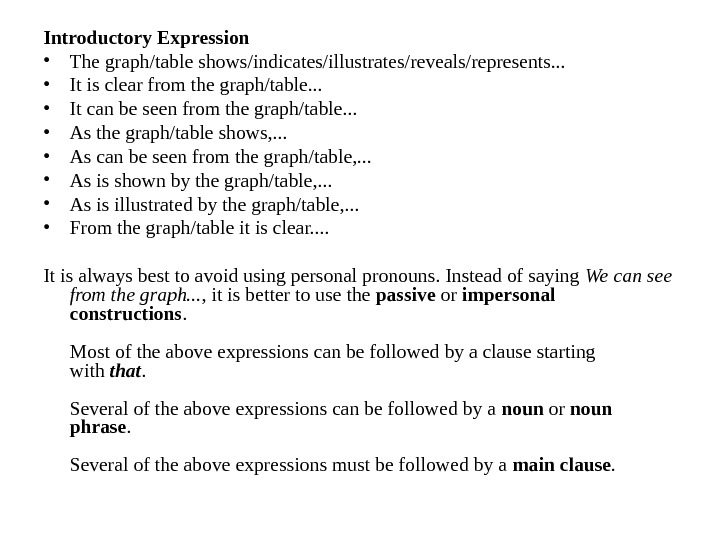
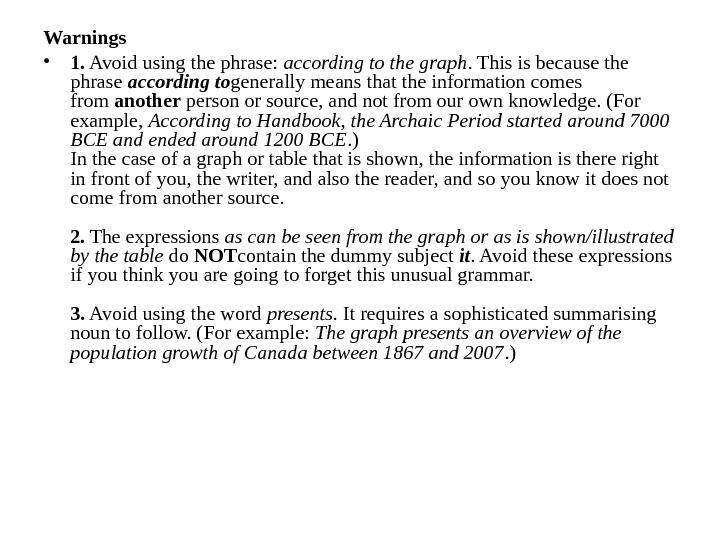

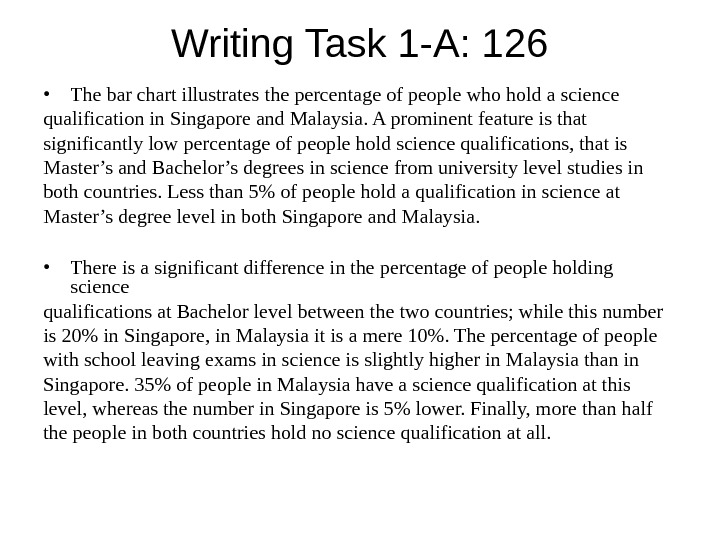
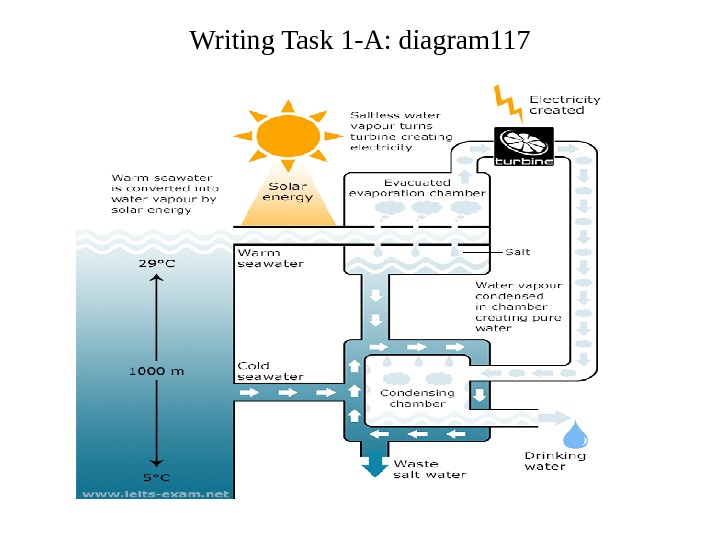
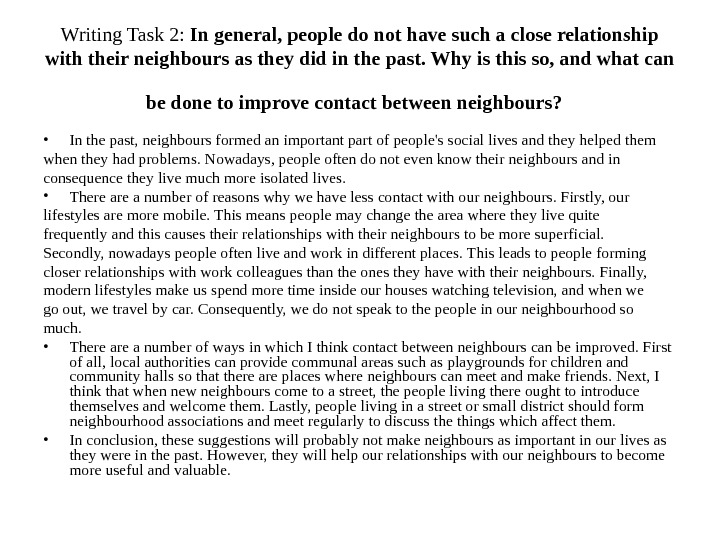

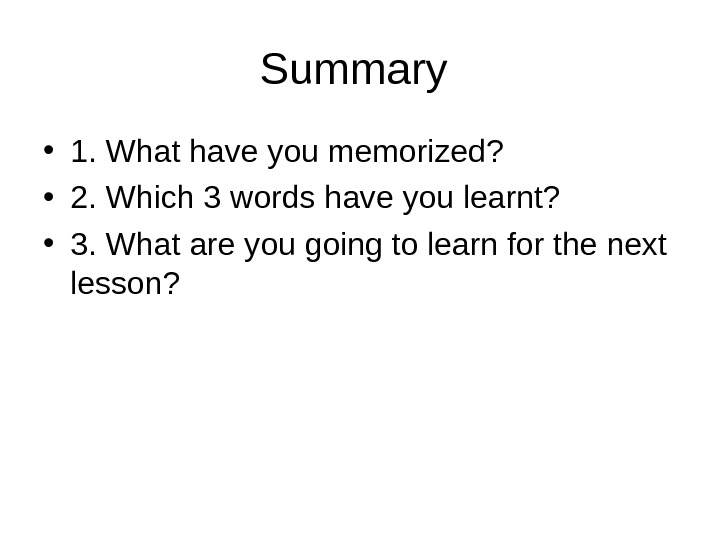
- Размер: 186.5 Кб
- Количество слайдов: 12
Описание презентации Презентация lesson 1 January по слайдам
 IELTS Speaking and Writing Lesson plan: 01/09/2016 1. Writing Task 2: freedom of speech, celebrities influence, relationships with neighbours and changes in my hometown 2. Writing Task 1 -A: 126, 117 3. Speaking Test: describing a piece of equipment and a letter
IELTS Speaking and Writing Lesson plan: 01/09/2016 1. Writing Task 2: freedom of speech, celebrities influence, relationships with neighbours and changes in my hometown 2. Writing Task 1 -A: 126, 117 3. Speaking Test: describing a piece of equipment and a letter
 Speaking Test • 1. Describe a piece of equipment you often use at home or at work. You should say: • What it is • What you do with it/ How to use it • How long you have had it • How important it is to you Discussion: • What are the impacts of electrical equipment on human’s life in the past ten years? • What are the differences of the life in the past and at the present? • What role does technological development play in people’s life? • How will technology develop in the future? • Do you have a mobile phone? What are its advantages? • Why do many foreign countries develop faster than Ukraine? • Why does the West of Ukraine develop faster than the East of Ukraine? • What are the advantages and disadvantages of computer and internet?
Speaking Test • 1. Describe a piece of equipment you often use at home or at work. You should say: • What it is • What you do with it/ How to use it • How long you have had it • How important it is to you Discussion: • What are the impacts of electrical equipment on human’s life in the past ten years? • What are the differences of the life in the past and at the present? • What role does technological development play in people’s life? • How will technology develop in the future? • Do you have a mobile phone? What are its advantages? • Why do many foreign countries develop faster than Ukraine? • Why does the West of Ukraine develop faster than the East of Ukraine? • What are the advantages and disadvantages of computer and internet?
 Describe a letter You should say: • When you received it • Who sent it to you • What it is about • Whether it is important to you Discussion: • What is the difference between letter and e-mail? • Do you often keep diaries? • What is the difference between diary and letter? • What is the difference in the past and at the present as regards communications? • What is the role of letter 50 years ago and at the present? • What do you think of its role 50 years later? • What do you think of creative writing? • Would post office disappear 50 years later? • What role does computer play in our society? • What changes have been brought by the computer? What is professors’ attitude?
Describe a letter You should say: • When you received it • Who sent it to you • What it is about • Whether it is important to you Discussion: • What is the difference between letter and e-mail? • Do you often keep diaries? • What is the difference between diary and letter? • What is the difference in the past and at the present as regards communications? • What is the role of letter 50 years ago and at the present? • What do you think of its role 50 years later? • What do you think of creative writing? • Would post office disappear 50 years later? • What role does computer play in our society? • What changes have been brought by the computer? What is professors’ attitude?
 Writing Task 1 -A One the hardest part of IELTS writing module is writing the introduction. If you have a good technique for this, then the rest of the task is easy. • The first thing to note is that writing about Tables, Graphs and Diagrams is not the same as writing an essay in IELTS writing task 2: • You are NOT asked to give your opinion on the information, but generally to write a report describing the information factually. • It is NOT necessary to write an introduction like in an essay for this writing task. You are writing a report, which means that you do NOT begin with a broad general statement about the topic. • You do NOT need to write a conclusion which gives any kind of opinion about the significance of the information. Three steps to keep up • 1. Identify the main idea behind the graph or table. This will be the focus of your first sentence. 2. Consider the details of what is being shown — the units of measurement and the time frame — and decide how much you need to include. 3. Consider the language to use — the introductory expressions, the tenses of the verbs, the correct expressions of time and I or measurement etc.
Writing Task 1 -A One the hardest part of IELTS writing module is writing the introduction. If you have a good technique for this, then the rest of the task is easy. • The first thing to note is that writing about Tables, Graphs and Diagrams is not the same as writing an essay in IELTS writing task 2: • You are NOT asked to give your opinion on the information, but generally to write a report describing the information factually. • It is NOT necessary to write an introduction like in an essay for this writing task. You are writing a report, which means that you do NOT begin with a broad general statement about the topic. • You do NOT need to write a conclusion which gives any kind of opinion about the significance of the information. Three steps to keep up • 1. Identify the main idea behind the graph or table. This will be the focus of your first sentence. 2. Consider the details of what is being shown — the units of measurement and the time frame — and decide how much you need to include. 3. Consider the language to use — the introductory expressions, the tenses of the verbs, the correct expressions of time and I or measurement etc.
 Introductory Expression • The graph/table shows/indicates/illustrates/reveals/represents. . . • It is clear from the graph/table. . . • It can be seen from the graph/table. . . • As the graph/table shows, . . . • As can be seen from the graph/table, . . . • As is shown by the graph/table, . . . • As is illustrated by the graph/table, . . . • From the graph/table it is clear. . It is always best to avoid using personal pronouns. Instead of saying We can see from the graph. . . , it is better to use the passive or impersonal constructions. Most of the above expressions can be followed by a clause starting with that. Several of the above expressions can be followed by a noun or noun phrase. Several of the above expressions must be followed by a main clause.
Introductory Expression • The graph/table shows/indicates/illustrates/reveals/represents. . . • It is clear from the graph/table. . . • It can be seen from the graph/table. . . • As the graph/table shows, . . . • As can be seen from the graph/table, . . . • As is shown by the graph/table, . . . • As is illustrated by the graph/table, . . . • From the graph/table it is clear. . It is always best to avoid using personal pronouns. Instead of saying We can see from the graph. . . , it is better to use the passive or impersonal constructions. Most of the above expressions can be followed by a clause starting with that. Several of the above expressions can be followed by a noun or noun phrase. Several of the above expressions must be followed by a main clause.
 Warnings • 1. Avoid using the phrase: according to the graph. This is because the phrase according to generally means that the information comes from another person or source, and not from our own knowledge. (For example, According to Handbook, the Archaic Period started around 7000 BCE and ended around 1200 BCE. ) In the case of a graph or table that is shown, the information is there right in front of you, the writer, and also the reader, and so you know it does not come from another source. 2. The expressions as can be seen from the graph or as is shown/illustrated by the table do NOT contain the dummy subject it. Avoid these expressions if you think you are going to forget this unusual grammar. 3. Avoid using the word presents. It requires a sophisticated summarising noun to follow. (For example: The graph presents an overview of the population growth of Canada between 1867 and 2007. )
Warnings • 1. Avoid using the phrase: according to the graph. This is because the phrase according to generally means that the information comes from another person or source, and not from our own knowledge. (For example, According to Handbook, the Archaic Period started around 7000 BCE and ended around 1200 BCE. ) In the case of a graph or table that is shown, the information is there right in front of you, the writer, and also the reader, and so you know it does not come from another source. 2. The expressions as can be seen from the graph or as is shown/illustrated by the table do NOT contain the dummy subject it. Avoid these expressions if you think you are going to forget this unusual grammar. 3. Avoid using the word presents. It requires a sophisticated summarising noun to follow. (For example: The graph presents an overview of the population growth of Canada between 1867 and 2007. )
 The chart below gives information about science qualifications held by people in two countries.
The chart below gives information about science qualifications held by people in two countries.
 Writing Task 1 -A: 126 • The bar chart illustrates the percentage of people who hold a science qualification in Singapore and Malaysia. A prominent feature is that significantly low percentage of people hold science qualifications, that is Master’s and Bachelor’s degrees in science from university level studies in both countries. Less than 5% of people hold a qualification in science at Master’s degree level in both Singapore and Malaysia. • There is a significant difference in the percentage of people holding science qualifications at Bachelor level between the two countries; while this number is 20% in Singapore, in Malaysia it is a mere 10%. The percentage of people with school leaving exams in science is slightly higher in Malaysia than in Singapore. 35% of people in Malaysia have a science qualification at this level, whereas the number in Singapore is 5% lower. Finally, more than half the people in both countries hold no science qualification at all.
Writing Task 1 -A: 126 • The bar chart illustrates the percentage of people who hold a science qualification in Singapore and Malaysia. A prominent feature is that significantly low percentage of people hold science qualifications, that is Master’s and Bachelor’s degrees in science from university level studies in both countries. Less than 5% of people hold a qualification in science at Master’s degree level in both Singapore and Malaysia. • There is a significant difference in the percentage of people holding science qualifications at Bachelor level between the two countries; while this number is 20% in Singapore, in Malaysia it is a mere 10%. The percentage of people with school leaving exams in science is slightly higher in Malaysia than in Singapore. 35% of people in Malaysia have a science qualification at this level, whereas the number in Singapore is 5% lower. Finally, more than half the people in both countries hold no science qualification at all.
 Writing Task 1 -A: diagram
Writing Task 1 -A: diagram
 Writing Task 2: In general, people do not have such a close relationship with their neighbours as they did in the past. Why is this so, and what can be done to improve contact between neighbours? • In the past, neighbours formed an important part of people’s social lives and they helped them when they had problems. Nowadays, people often do not even know their neighbours and in consequence they live much more isolated lives. • There a number of reasons why we have less contact with our neighbours. Firstly, our lifestyles are mobile. This means people may change the area where they live quite frequently and this causes their relationships with their neighbours to be more superficial. Secondly, nowadays people often live and work in different places. This leads to people forming closer relationships with work colleagues than the ones they have with their neighbours. Finally, modern lifestyles make us spend more time inside our houses watching television, and when we go out, we travel by car. Consequently, we do not speak to the people in our neighbourhood so much. • There a number of ways in which I think contact between neighbours can be improved. First of all, local authorities can provide communal areas such as playgrounds for children and community halls so that there are places where neighbours can meet and make friends. Next, I think that when new neighbours come to a street, the people living there ought to introduce themselves and welcome them. Lastly, people living in a street or small district should form neighbourhood associations and meet regularly to discuss the things which affect them. • In conclusion, these suggestions will probably not make neighbours as important in our lives as they were in the past. However, they will help our relationships with our neighbours to become more useful and valuable.
Writing Task 2: In general, people do not have such a close relationship with their neighbours as they did in the past. Why is this so, and what can be done to improve contact between neighbours? • In the past, neighbours formed an important part of people’s social lives and they helped them when they had problems. Nowadays, people often do not even know their neighbours and in consequence they live much more isolated lives. • There a number of reasons why we have less contact with our neighbours. Firstly, our lifestyles are mobile. This means people may change the area where they live quite frequently and this causes their relationships with their neighbours to be more superficial. Secondly, nowadays people often live and work in different places. This leads to people forming closer relationships with work colleagues than the ones they have with their neighbours. Finally, modern lifestyles make us spend more time inside our houses watching television, and when we go out, we travel by car. Consequently, we do not speak to the people in our neighbourhood so much. • There a number of ways in which I think contact between neighbours can be improved. First of all, local authorities can provide communal areas such as playgrounds for children and community halls so that there are places where neighbours can meet and make friends. Next, I think that when new neighbours come to a street, the people living there ought to introduce themselves and welcome them. Lastly, people living in a street or small district should form neighbourhood associations and meet regularly to discuss the things which affect them. • In conclusion, these suggestions will probably not make neighbours as important in our lives as they were in the past. However, they will help our relationships with our neighbours to become more useful and valuable.
 Writing Sample #139 If you could change one important thing about your hometown, what would you change? Use reasons and specific examples. • If I could change one thing about my hometown, I think it would be the fact that there’s no sense of community here. People don’t feel connected, they don’t look out for each other, and they don’t get to know their neighbors. People come and go a lot here. They change jobs frequently and move on. This means that they don’t put down roots in the community. They don’t join community organizations and they’re not willing to get involved in trying to improve the quality of life. If someone has a petition to put in a new street light, she has a very hard time getting a lot of people to sign. They don’t feel it has anything to do with them. They don’t get involved in improving the schools because they don’t think the quality of education is important to their lives. They don’t see the connection between themselves and the rest of their community. People don’t try to support others around them. They don’t keep a friendly eye on their children, or check in on older folks if they don’t see them for a few days. They’re not aware when people around them may be going through a hard time. For example, they may not know if a neighbor loses a loved one. There’s not a lot of community support for individuals. Neighbors don’t get to know each other. Again, this is because people come and go within a few years. So when neighbors go on vacation, no one is keeping an eye on their house. No one is making sure nothing suspicious is going on there, like lights in the middle of the night. When neighbors’ children are cutting across someone’s lawn on their bikes, there’s no friendly way of casually mentioning the problem. People immediately act as if it’s a major property disagreement. My hometown is a nice place to live in many ways, but it would be much nice if we had that sense of community.
Writing Sample #139 If you could change one important thing about your hometown, what would you change? Use reasons and specific examples. • If I could change one thing about my hometown, I think it would be the fact that there’s no sense of community here. People don’t feel connected, they don’t look out for each other, and they don’t get to know their neighbors. People come and go a lot here. They change jobs frequently and move on. This means that they don’t put down roots in the community. They don’t join community organizations and they’re not willing to get involved in trying to improve the quality of life. If someone has a petition to put in a new street light, she has a very hard time getting a lot of people to sign. They don’t feel it has anything to do with them. They don’t get involved in improving the schools because they don’t think the quality of education is important to their lives. They don’t see the connection between themselves and the rest of their community. People don’t try to support others around them. They don’t keep a friendly eye on their children, or check in on older folks if they don’t see them for a few days. They’re not aware when people around them may be going through a hard time. For example, they may not know if a neighbor loses a loved one. There’s not a lot of community support for individuals. Neighbors don’t get to know each other. Again, this is because people come and go within a few years. So when neighbors go on vacation, no one is keeping an eye on their house. No one is making sure nothing suspicious is going on there, like lights in the middle of the night. When neighbors’ children are cutting across someone’s lawn on their bikes, there’s no friendly way of casually mentioning the problem. People immediately act as if it’s a major property disagreement. My hometown is a nice place to live in many ways, but it would be much nice if we had that sense of community.
 Summary • 1. What have you memorized? • 2. Which 3 words have you learnt? • 3. What are you going to learn for the next lesson?
Summary • 1. What have you memorized? • 2. Which 3 words have you learnt? • 3. What are you going to learn for the next lesson?

